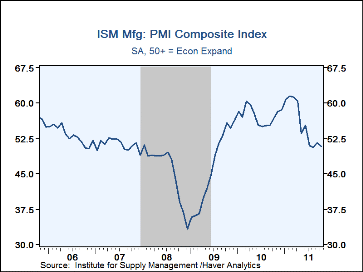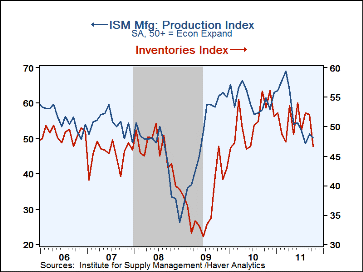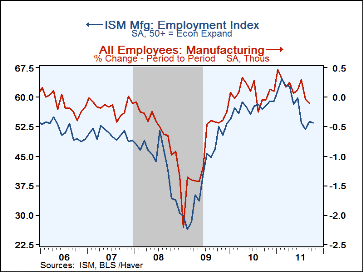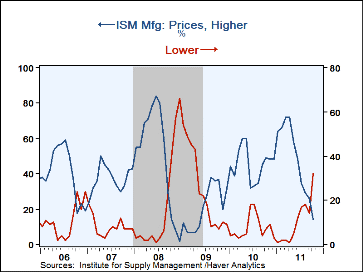 Global| Nov 01 2011
Global| Nov 01 2011U.S. ISM Factory Index Slips Back
by:Tom Moeller
|in:Economy in Brief
Summary
As foreshadowed by yesterday's report from the Chicago Purchasing Managers, the Institute for Supply Management reported today that its October Composite Index of factory sector activity slipped. The decline to 50.8 was from an [...]
As foreshadowed by yesterday's report from the Chicago Purchasing Managers, the Institute for Supply Management reported today that its October Composite Index of factory sector activity slipped. The decline to 50.8 was from an unrevised 51.6 in September and it remained near the lowest since the economic recovery began two years ago. The latest reading was lower than Consensus expectations for improvement to 52.0. Nevertheless, the index indicated positive, but slower, factory growth and was the twenty-seventh consecutive monthly figure above the break-even level of 50.
Most of the index's five components were off m/m. The new orders series rose but the production, supplier delivery, inventory, and employment series each slipped or fell. During the last ten years there has been an 89% correlation between the employment series level and the m/m change in factory sector payrolls.
The price reading fell sharply to 41.0. It was the first reading below the break-even level of 50 since the recovery began. Just fourteen percent of firms raised prices, the least since the recession's end, while an increased one-third lowered them. During the last ten years there has been an 83% correlation between the index and the m/m change in the core intermediate producer price index.
The separate index of new export orders fell to 50.0, its lowest level since the recovery began. Reflecting weakness in the U.S. economic recovery, the imports series fell below break-even, also the lowest level since recovery began.
The ISM figures are diffusion indexes and can be found in Haver's USECON database. The expectations data are in the AS1REPNA database.
| ISM Mfg | Oct | Sep | Aug | Oct'10 | 2010 | 2009 | 2008 |
|---|---|---|---|---|---|---|---|
| Composite Index | 50.8 | 51.6 | 50.6 | 56.9 | 57.3 | 46.3 | 45.5 |
| New Orders | 52.4 | 49.6 | 49.6 | 59.9 | 59.3 | 51.7 | 42.1 |
| Employment | 53.5 | 53.8 | 51.8 | 57.9 | 57.3 | 40.6 | 43.1 |
| Production | 50.1 | 51.2 | 48.6 | 61.4 | 61.1 | 50.5 | 45.1 |
| Supplier Deliveries | 51.3 | 51.4 | 50.6 | 52.3 | 58.1 | 51.5 | 51.6 |
| Inventories | 46.7 | 52.0 | 52.3 | 53.2 | 50.8 | 37.1 | 45.5 |
| Prices Paid Index (NSA) | 41.0 | 56.0 | 55.5 | 71.0 | 68.9 | 48.3 | 66.5 |
Tom Moeller
AuthorMore in Author Profile »Prior to joining Haver Analytics in 2000, Mr. Moeller worked as the Economist at Chancellor Capital Management from 1985 to 1999. There, he developed comprehensive economic forecasts and interpreted economic data for equity and fixed income portfolio managers. Also at Chancellor, Mr. Moeller worked as an equity analyst and was responsible for researching and rating companies in the economically sensitive automobile and housing industries for investment in Chancellor’s equity portfolio. Prior to joining Chancellor, Mr. Moeller was an Economist at Citibank from 1979 to 1984. He also analyzed pricing behavior in the metals industry for the Council on Wage and Price Stability in Washington, D.C. In 1999, Mr. Moeller received the award for most accurate forecast from the Forecasters' Club of New York. From 1990 to 1992 he was President of the New York Association for Business Economists. Mr. Moeller earned an M.B.A. in Finance from Fordham University, where he graduated in 1987. He holds a Bachelor of Arts in Economics from George Washington University.










